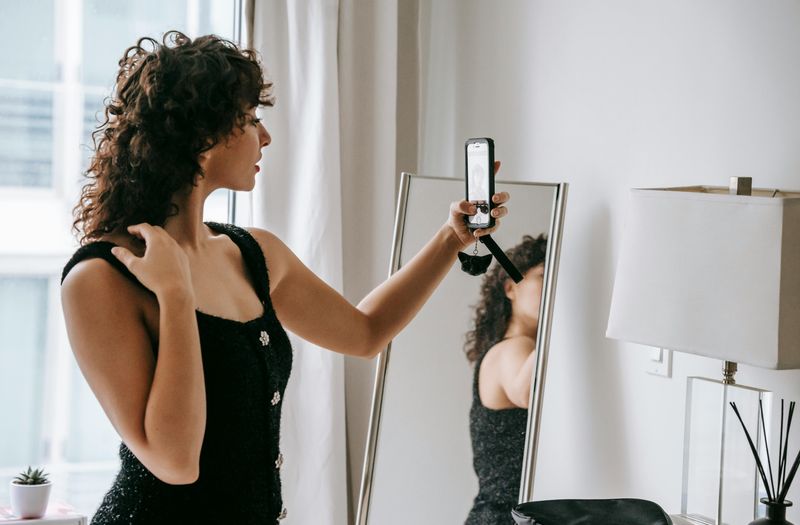13 Awful Female Behaviors Society Still Teaches Men to Romanticize

Movies, TV shows, and social media often paint certain behaviors as attractive or romantic when they’re actually unhealthy. Many men grow up learning to see red flags as love signals, confusing manipulation with passion and control with care. Understanding these patterns helps everyone build stronger, more honest relationships. Recognizing what real love looks like starts with unlearning what society wrongly glorifies.
1. Overspending

Society labels reckless spending as having luxurious taste or being high maintenance, making it seem glamorous. But constantly demanding expensive gifts or blowing money on designer items often hides deeper insecurity or a need to prove worth through material things.
Real love doesn’t require draining bank accounts to feel validated. Partners who truly care about you appreciate thoughtfulness over price tags.
When someone constantly needs expensive things to feel loved, it creates an exhausting cycle where affection becomes transactional. Healthy relationships value experiences and genuine connection far more than the latest handbag or fancy dinner that costs a week’s salary.
2. Excessive Flirtiness

Flirting with everyone in sight gets mistaken for confidence or magnetic charm in countless rom-coms. The reality? Excessive flirtation blurs boundaries and plants seeds of insecurity in partners who wonder if they’re actually special.
True confidence doesn’t need constant attention from strangers to feel worthy. Someone secure in themselves can be friendly without turning every interaction into a flirtation contest.
When flirting becomes a habit rather than genuine interest, it creates confusion about intentions and loyalty. Healthy attraction focuses energy on building trust with one person instead of collecting validation from everyone in the room like trophies on a shelf.
3. Unpredictable Mood Swings

Films often portray wild emotional swings as endearing unpredictability or passionate intensity. One minute she’s laughing, the next she’s furious, and partners are supposed to find this exciting rather than exhausting.
Extreme highs and lows actually signal poor emotional regulation and communication problems. Walking on eggshells wondering which mood will greet you isn’t romance—it’s stress.
Everyone has bad days, but using mood swings to control situations or avoid accountability crosses into unhealthy territory. Stable emotional responses and honest conversations about feelings create the foundation for lasting intimacy, not the rollercoaster ride that leaves everyone dizzy and confused about where they stand.
4. Obsessive Vanity

Self-care has become the excuse for obsessing over appearance and social media image. Spending hours perfecting every photo, constantly checking mirrors, and prioritizing looks above everything else gets rebranded as confidence or self-love.
But vanity crosses into unhealthy territory when physical appearance becomes the only measure of worth. Relationships built on aesthetics crumble when real life demands substance.
Someone genuinely confident can leave the house without perfect makeup or post a photo without fifty filters. When vanity dominates, conversations become shallow and connections lack depth because the focus stays stuck on surfaces rather than exploring what’s underneath all those carefully curated images.
5. Possessive Jealousy

Jealousy gets framed as proof of deep love in countless songs and movies. She checks your phone because she cares so much, right? Wrong. Jealousy usually stems from fear and the desire to control rather than genuine affection.
Healthy relationships grow from trust, not territorial behavior that treats partners like property. Someone who constantly questions where you are, who you’re with, and what you’re doing isn’t showing love—they’re revealing their own insecurities.
Real intimacy means trusting your partner to make good choices without surveillance. Love shouldn’t feel like living under a microscope where every friendship gets interrogated and every smile at a stranger triggers an interrogation.
6. Suffocating Over-Dependence

Movies romanticize the idea of someone who can’t function without their partner, calling it devotion or true love. But excessive dependence actually suffocates relationships faster than almost anything else.
Needing your partner for every decision, every outing, and every moment of happiness puts impossible pressure on them. True intimacy thrives when both people maintain their own interests and friendships.
Over-dependence turns partners into emotional support animals rather than equals. Healthy love celebrates individuality and encourages growth, not the kind of clingy behavior that makes someone feel responsible for another person’s entire emotional wellbeing and happiness every single waking moment without breathing room.
7. Playing Hard to Get

Dating advice constantly pushes the hard-to-get strategy as mysterious and alluring. Ignore texts for days, cancel plans last minute, and act disinterested to keep them chasing.
This game-playing just creates confusion and builds relationships on dishonesty from the start. Genuine attraction shouldn’t require manipulation tactics or treating people like puzzles to solve. Someone truly interested shows it through consistent, honest communication rather than strategic silence.
Playing games might create temporary intrigue, but it prevents real connection from forming. Mature relationships begin with straightforward intentions, not elaborate schemes designed to make someone work harder for attention that should flow naturally between two people who actually like each other.
8. Constant Drama

Passion and intensity get confused with habitual drama in popular culture. If there’s no crisis, some create one, turning minor issues into major catastrophes that demand immediate attention and emotional energy.
Drama might feel exciting initially, but it drains relationships over time. Healthy communication happens calmly, not through explosive arguments and manufactured emergencies. Steady, reliable affection outlasts chaos every time.
Someone who thrives on drama often avoids dealing with real issues by creating distractions. Peace isn’t boring—it’s the foundation that lets love actually grow instead of burning out from constant fires that never needed starting in the first place but somehow always appear right on schedule.
9. Excessive Neediness

Constant demands for attention get portrayed as vulnerability or expressions of deep love. But neediness often masks insecurity that no amount of external reassurance can truly fix.
Texting every five minutes, requiring constant compliments, and falling apart when left alone for an afternoon isn’t romantic—it’s exhausting. Balance and trust create stronger bonds than desperate clinging. Everyone needs reassurance sometimes, but making it your partner’s full-time job to validate your existence creates an unhealthy dynamic.
Self-worth should come from within, not from someone else’s ability to constantly prove their affection. Healthy love allows space for both people to breathe without the relationship collapsing from brief moments apart.
10. Unearned Entitlement

Sometimes entitlement gets mistaken for confidence or knowing your worth. But there’s a massive difference between healthy self-respect and expecting the world to revolve around you without reciprocation.
Entitled behavior creates one-sided relationships where appreciation and compromise disappear completely. Respect must flow both directions, not just toward one person’s demands. Someone entitled expects their partner to constantly accommodate their needs while dismissing everyone else’s feelings as less important.
Healthy relationships require give and take, not one person acting like royalty while the other serves. True partnership means both people’s needs matter equally, not just whoever throws the biggest fit when they don’t get their way immediately.
11. Competitive Rivalry

Ambition sounds positive until it turns into constant comparison with others. Some women compete with everyone—friends, strangers, even their partner’s exes—turning relationships into battlegrounds instead of safe spaces.
This rivalry gets romanticized as confidence or drive, but it actually breeds resentment. Healthy couples work as teammates, not competitors measuring who’s winning. Someone always comparing themselves to others never finds satisfaction because there’s always another person to measure against.
This mindset poisons intimacy by making everything a contest. Real partnership celebrates each other’s successes instead of keeping score or feeling threatened when someone else shines brightly in their own unique way that has nothing to do with you.
12. Manipulative Crying

Tears get automatic sympathy, and sensitivity is often seen as emotional depth. But frequent crying to control situations or win arguments crosses into manipulation territory pretty quickly. Genuine vulnerability invites connection and understanding.
Weaponizing tears to avoid accountability or get your way creates guilt instead of intimacy. Everyone cries sometimes, and authentic emotions deserve respect. The difference appears when tears become a strategy deployed whenever someone doesn’t want to face consequences or have difficult conversations.
Healthy relationships allow space for real feelings while recognizing when waterworks serve as shields against honesty rather than expressions of true emotion that deserve compassion and understanding from caring partners.
13. Constant Validation-Seeking

Needing endless reassurance gets packaged as cute or affectionate behavior. Do you still love me? Am I pretty? Are you sure you’re not mad? Asked occasionally, these questions show normal vulnerability.
Asked constantly, they drain relationships dry and reveal deeper insecurity that external validation can’t fix. Self-worth must come from within, not from a partner’s ability to provide approval on demand every hour.
Someone secure in themselves trusts their partner’s affection without requiring constant proof. Healthy love includes reassurance when needed, but not as a daily requirement that turns partners into validation machines working overtime to fill a hole that only self-acceptance can actually heal properly.

Comments
Loading…